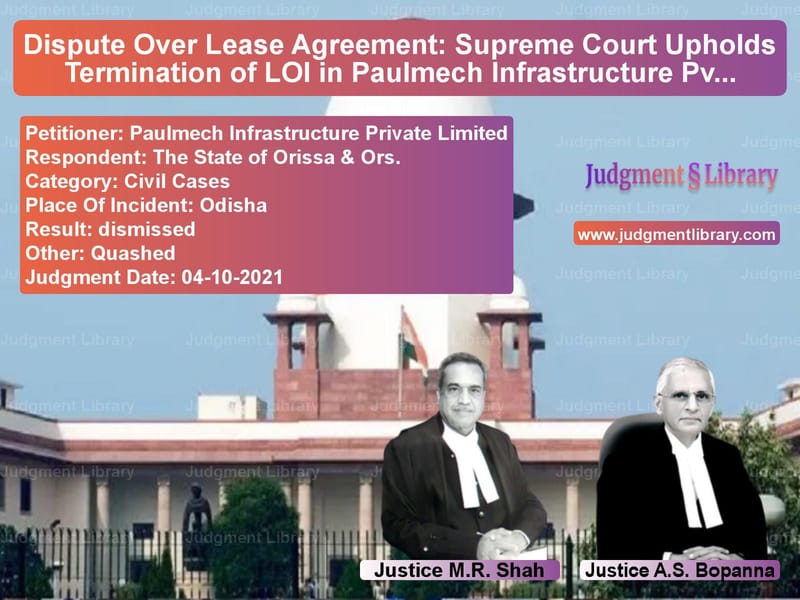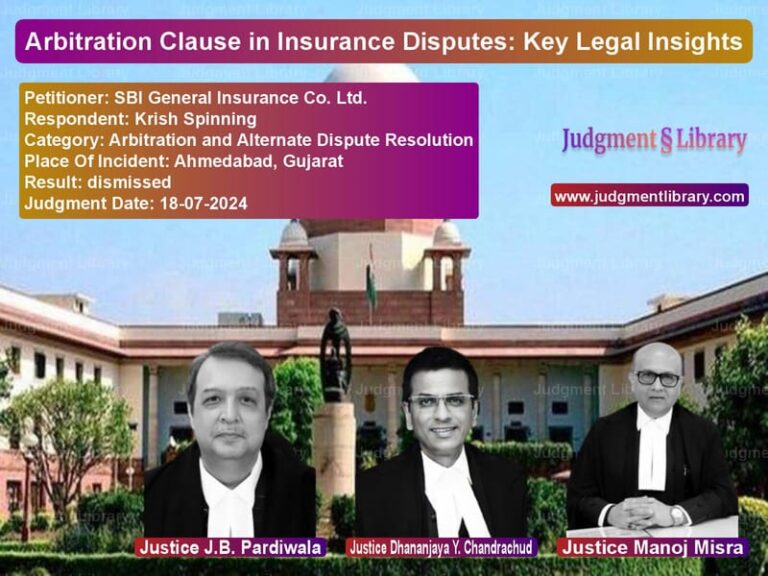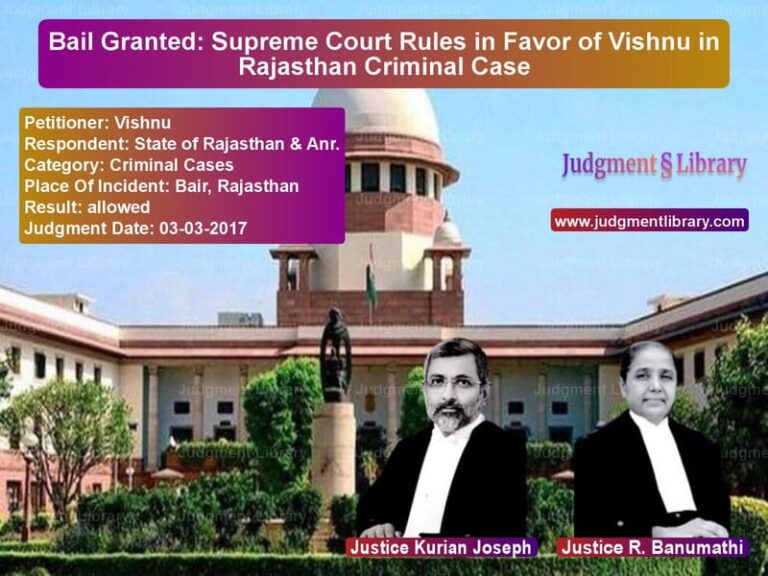Dispute Over Lease Agreement: Supreme Court Upholds Termination of LOI in Paulmech Infrastructure Pvt. Ltd. vs. State of Orissa
The Supreme Court of India recently delivered a judgment in Paulmech Infrastructure Pvt. Ltd. vs. The State of Orissa & Ors., which involved a contractual dispute regarding a lease agreement between a private company and a government entity. The case primarily revolved around the validity of a Letter of Intent (LOI) and whether the petitioner had the right to enforce its terms despite non-compliance with financial obligations.
Background of the Case
The dispute arose when the State of Odisha had leased a property to Utkal Ashok Hotel Corporation Limited (UAHCL) for 99 years under an agreement dated 24.01.1989. UAHCL operated a hotel named ‘Hotel Nilachal Ashok’ on the leased property. Due to financial difficulties, the hotel was shut down in 2004 with the approval of the Board of Directors. In 2009, UAHCL decided to lease the property to a private party for 40 years and invited bids through a tender process.
Paulmech Infrastructure Pvt. Ltd. (the appellant) participated in the bidding and emerged as the highest bidder. Consequently, UAHCL issued a Letter of Intent (LOI) on 19.01.2010, laying down certain financial obligations that the appellant had to fulfill before executing the lease agreement.
Read also: https://judgmentlibrary.com/supreme-court-directs-ex-gratia-compensation-for-covid-19-deaths/
Key Terms of the LOI
The LOI required the appellant to:
- Pay Rs. 9.34 crores within 30 days, which included:
- A non-refundable upfront payment of Rs. 8.82 crores.
- A security deposit of Rs. 26 lakhs.
- An advance minimum guaranteed annual lease premium of Rs. 26 lakhs.
- Execute the lease agreement upon making the required payment.
The appellant failed to pay the full amount within the stipulated time but sought an extension, which UAHCL granted. The deadline was extended until 15.12.2010. However, the appellant again failed to meet the deadline.
Cancellation of LOI and Legal Challenge
Due to repeated delays, UAHCL terminated the LOI through a communication dated 10.12.2013. Paulmech Infrastructure Pvt. Ltd. challenged this termination by filing a writ petition before the Orissa High Court, seeking enforcement of the LOI and execution of the lease agreement. The High Court dismissed the petition, stating that the dispute involved contractual matters requiring adjudication by an appropriate civil forum.
Aggrieved by this decision, the appellant approached the Supreme Court.
Arguments Presented
Petitioner’s Arguments (Paulmech Infrastructure Pvt. Ltd.)
The appellant contended that:
- The termination of the LOI was unjustified as the majority of the required payments had already been made.
- The payments were accepted by UAHCL, and no explicit rejection was communicated.
- The additional demand for covering the voluntary retirement costs of UAHCL employees was not a part of the original LOI and should not have been imposed.
- The company was willing to pay the balance amount with interest, and therefore, UAHCL should be directed to execute the lease agreement.
Respondent’s Arguments (UAHCL and the State of Odisha)
The respondents argued that:
- The appellant had repeatedly failed to make timely payments, despite being granted multiple extensions.
- Even the payments made after the final deadline were accepted only as a concession and did not alter the contract’s terms.
- The LOI explicitly stated that the upfront amount was non-refundable, and the appellant had no claim to recover it.
- Since the lease agreement was never executed due to the appellant’s default, the claim for enforcing the LOI was legally untenable.
Supreme Court’s Analysis and Findings
Validity of the LOI Termination
The Supreme Court upheld the termination of the LOI, stating:
“The appellant had failed to adhere to the terms indicated in the LOI dated 19.01.2010, and the payments required thereunder were not made even within the extended period. The Board of Directors of UAHCL was justified in deciding to terminate the LOI through their letter dated 10.12.2013.”
The Court emphasized that the appellant’s failure to comply with financial obligations despite repeated extensions rendered the LOI unenforceable.
Refund of Payments
The Court ruled that:
- The amount of Rs. 4.11 crores, paid after the final deadline, was clearly beyond the contract’s stipulated timeframe and could not be retained by UAHCL. Therefore, this amount was ordered to be refunded.
- The amount of Rs. 4.41 crores, paid within the extended deadline, was a matter requiring further adjudication. The Court allowed the appellant to file a civil suit to seek recovery of this amount.
- UAHCL was permitted to claim damages incurred due to the appellant’s default, and any such claims could be addressed in a civil court.
Non-Refundable Clause
The Court observed that while the LOI described the upfront amount as “non-refundable,” it did not use the term “forfeiture.” Hence, in the absence of a valid lease agreement, the non-refundable clause could not be enforced to unjustly enrich UAHCL.
Final Judgment
The Supreme Court modified the High Court’s order and ruled:
- The termination of the LOI was valid and upheld.
- The appellant was not entitled to execution of the lease agreement.
- UAHCL was directed to refund Rs. 4.11 crores within four weeks.
- The appellant was granted liberty to file a civil suit for the recovery of Rs. 4.41 crores.
- UAHCL was allowed to seek a counterclaim for any damages incurred.
Significance of the Judgment
This judgment clarifies several important principles regarding contract enforcement and lease agreements:
- Non-compliance with financial obligations under an LOI can lead to valid termination of the agreement.
- Repeated extensions granted by a party do not imply indefinite leniency.
- A non-refundable clause in a contract cannot be enforced if the underlying agreement itself is not executed.
- Parties involved in government contracts must strictly adhere to financial deadlines to avoid disputes.
The Supreme Court’s ruling thus reinforces contractual discipline and upholds the principle that parties cannot claim rights under a contract they failed to fulfill.
Petitioner Name: Paulmech Infrastructure Private Limited.Respondent Name: The State of Orissa & Ors..Judgment By: Justice M.R. Shah, Justice A.S. Bopanna.Place Of Incident: Odisha.Judgment Date: 04-10-2021.
Don’t miss out on the full details! Download the complete judgment in PDF format below and gain valuable insights instantly!
Download Judgment: paulmech-infrastruct-vs-the-state-of-orissa-supreme-court-of-india-judgment-dated-04-10-2021.pdf
Directly Download Judgment: Directly download this Judgment
See all petitions in Contract Disputes
See all petitions in Property Disputes
See all petitions in Specific Performance
See all petitions in Judgment by Mukeshkumar Rasikbhai Shah
See all petitions in Judgment by A. S. Bopanna
See all petitions in dismissed
See all petitions in Quashed
See all petitions in supreme court of India judgments October 2021
See all petitions in 2021 judgments
See all posts in Civil Cases Category
See all allowed petitions in Civil Cases Category
See all Dismissed petitions in Civil Cases Category
See all partially allowed petitions in Civil Cases Category







